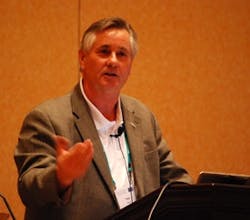People Are Catalyst for EPCs Quantum Leap
Is putting one block on top of the next, all there is to it? Not if you get people involved and start to use them to their full potential.
Construction tools and machines have modernized over the centuries, but many basic building methods—all based on labor, material and time—have remained pretty much the same since the pyramids, according to Peter Moore, vice president of Project Execution Services (PES) at Fluor. He is responsible for putting together teams at Fluor that work across functional groups.
"How are we executing projects differently these days?" he began. "Well, we're learning that it's more about people and processes and not so much just about technology. Technology is an enabler. However, if people don't know how to use it, then technology is useless."
Moore presented "Project Execution of The Future" in the Management Session on the first day of the Emerson Global Users Exchange on Sept. 28 at the Gaylord Palms Resort and Convention Center in Orlando, Fla.
"The aerospace industry went from Kitty Hawk in 1903 to the moon in 1969," said Moore. "This was a very short period—a quantum leap—that was based on a vision. Likewise, Mercedes-Benz started making craft-based vehicles, and then Ford mass produced them. The process got more integrated and automated, and we now have eManufacturing and 30% to 40% improvements in quality, costs and scheduling. This was another quantum leap based on a vision."
So where does this leave the engineering, procurement and construction (EPC) field as it faces the 21st century? What knowledge does EPC need to leverage to make its own quantum leap?
"The EPC industry has to become more innovative and collaborative," said Moore. "We have a lot of talent and are very good at problem-solving. However, it's rare that a solution finds its way to the larger organization, and it's even rarer for it to make it up to the larger EPC industry as a whole."
However, Moore emphasized that staff development is becoming even more of a priority at Fluor because more than half its employees have been with the company less then five years.
Consequently, Moore reports that the EPC organization of the future's business model needs to focus on:
- Global execution that enables participants to work anywhere and with anyone; to work on revamps and modernization projects at existing locations; and be able to establish new facilities in developing regions.
- Fostering more multi-party EPC execution, which includes partners, joint ventures, local content and suppliers.
- Expanding clients' perspective by streamlining their own data integration per plant; facilitating collaboration with EPCs and other suppliers; enabling cross-plant information exchange; investing in centralized automation and governance to optimize ROI; and discussing operating expenditures (OpEx) as part of the capital expenditure (CapEx) investment.
- Changing the competitive environment in which margins are thin; many competitors are in a weakened state and some consolidation is expected; and non-traditional competition is a threat, especially from small, nimble companies.
To achieve these goals, Moore added that EPC firms also must overcome workforce scarcity and mobility issues, improve supply chain integration and cooperation, encourage a more knowledge-enabled workforce, seek out and adopt better enabling technologies, and dare the change traditional work processes.
"We have to empower people to want to change," said Moore. "When they work on a new project, they must ask themselves what kind of legacy they want to leave behind. To succeed, all EPC employees need to use their personal imagination, embrace life-long learning, practice teamwork with a global perspective, be a change agent and adapt to change, create personal success through participation, achieve recognition for their expertise, create a legacy, leverage technology, think outside of the box and challenge the status quo."



